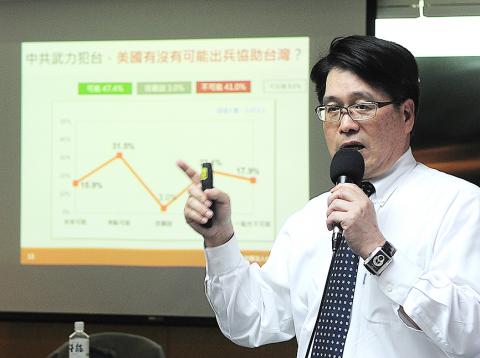The majority of Taiwanese do not think that China’s People’s Liberation Army (PLA) would invade Taiwan, a poll showed yesterday, with only 25.7 percent thinking such a scenario was likely.
The Taiwanese Public Opinion Foundation’s latest monthly survey found that 64.5 percent of respondents do not think such an attack is very likely.
Asked if the US was likely to send troops to help defend Taiwan in the event of a Chinese attack, 47.4 percent of respondents said they were confident of such support, but 41 percent said they had doubts.

Photo: Wang Yi-sung, Taipei Times
However, only 27.1 percent think the nation’s military would be able to repel any a PLA invasion, while 65.4 percent said they were not confident.
The survey was conducted from Sunday to Tuesday last week, just before the PLA conducted a live-fire exercise in the Taiwan Strait on Wednesday.
The poll found that 86.1 percent of respondents believe such military exercises by China do not serve to improve cross-strait relations, while 3.3 percent think they do help.
The survey found that 37.4 percent of respondents support the idea of Taiwan’s independence, 25.7 percent prefer maintaining the “status quo” and 23.8 percent favor unification with China.
A little more than half of respondents, 50.3 percent, believe that President Tsai Ing-wen’s (蔡英文) recent visit to Swaziland — now known as the Kingdom of Eswatini — did not help boost the nation’s international visibility, while 40.3 percent believe that it did.
The poll also found that 69.9 percent of respondents are dissatisfied with the nation’s international position and diplomatic situation, while 20.1 percent are satisfied.
In response to the statement: “Cross-strait relations are more important than diplomatic relations and to prevent provoking the Chinese Communist Party, it would be best for Taiwan to stop any efforts to boost its international position,” 65.6 percent of the respondents disagreed and 23.5 percent agreed.
Tsai’s public approval rating has dropped to 32 percent, a decline of 1.5 percentage points from a similar poll last month, and the third-lowest level since she took office on May 20, 2016, the poll found.
Her disapproval rating has climbed 2 percentage points to 49 percent since last month’s poll.
Former minister of national defense Michael Tsai (蔡明憲), who attended the foundation’s news conference on the poll results, said that the president should be more flexible in maintaining the “status quo.”
She could write a letter to the WHO and the UN secretary-general to express Taiwan’s desire and determination to join these organizations, he said.
Tsai Ing-wen could also propose a visit to the US in the wake of last month’s passage of the US’ Taiwan Travel Act, as her passiveness has been one of the reasons the public is dissatisfied with her, Michael Tsai said.
This month’s survey was conducted via telephone interviews among randomly selected adults over the age of 20. It collected 1,072 valid samples and had a margin of error of plus or minus 2.99 percentage points.

A magnitude 7.0 earthquake struck off Yilan at 11:05pm yesterday, the Central Weather Administration (CWA) said. The epicenter was located at sea, about 32.3km east of Yilan County Hall, at a depth of 72.8km, CWA data showed There were no immediate reports of damage. The intensity of the quake, which gauges the actual effect of a seismic event, measured 4 in Yilan County area on Taiwan’s seven-tier intensity scale, the data showed. It measured 4 in other parts of eastern, northern and central Taiwan as well as Tainan, and 3 in Kaohsiung and Pingtung County, and 2 in Lienchiang and Penghu counties and 1

FOREIGN INTERFERENCE: Beijing would likely intensify public opinion warfare in next year’s local elections to prevent Lai from getting re-elected, the ‘Yomiuri Shimbun’ said Internal documents from a Chinese artificial intelligence (AI) company indicated that China has been using the technology to intervene in foreign elections, including propaganda targeting Taiwan’s local elections next year and presidential elections in 2028, a Japanese newspaper reported yesterday. The Institute of National Security of Vanderbilt University obtained nearly 400 pages of documents from GoLaxy, a company with ties to the Chinese government, and found evidence that it had apparently deployed sophisticated, AI-driven propaganda campaigns in Hong Kong and Taiwan to shape public opinion, the Yomiuri Shimbun reported. GoLaxy provides insights, situation analysis and public opinion-shaping technology by conducting network surveillance

Taiwan is gearing up to celebrate the New Year at events across the country, headlined by the annual countdown and Taipei 101 fireworks display at midnight. Many of the events are to be livesteamed online. See below for lineups and links: Taipei Taipei’s New Year’s Party 2026 is to begin at 7pm and run until 1am, with the theme “Sailing to the Future.” South Korean girl group KARA is headlining the concert at Taipei City Hall Plaza, with additional performances by Amber An (安心亞), Nick Chou (周湯豪), hip-hop trio Nine One One (玖壹壹), Bii (畢書盡), girl group Genblue (幻藍小熊) and more. The festivities are to

Auckland rang in 2026 with a downtown fireworks display launched from New Zealand’s tallest structure, Sky Tower, making it the first major city to greet the new year at a celebration dampened by rain, while crowds in Taipei braved the elements to watch Taipei 101’s display. South Pacific countries are the first to bid farewell to 2025. Clocks struck midnight in Auckland, with a population of 1.7 million, 18 hours before the famous ball was to drop in New York’s Times Square. The five-minute display involved 3,500 fireworks launched from the 240m Sky Tower. Smaller community events were canceled across New Zealand’s